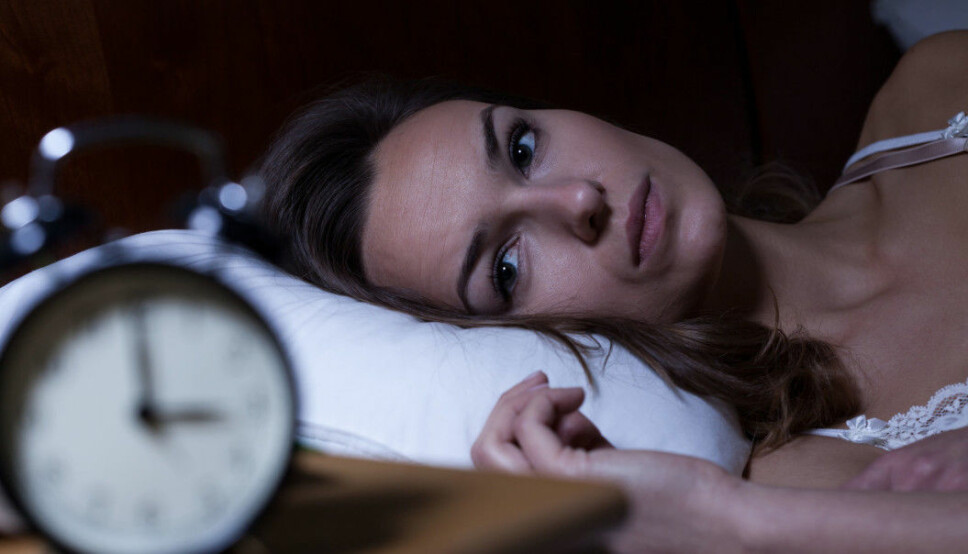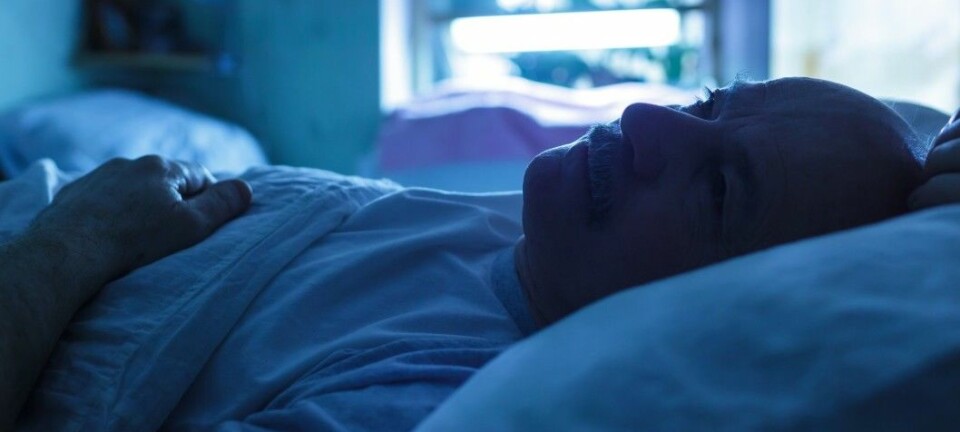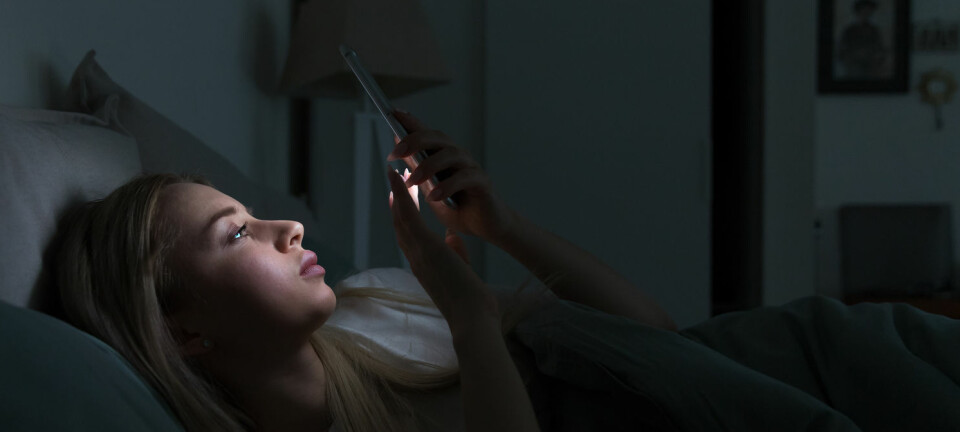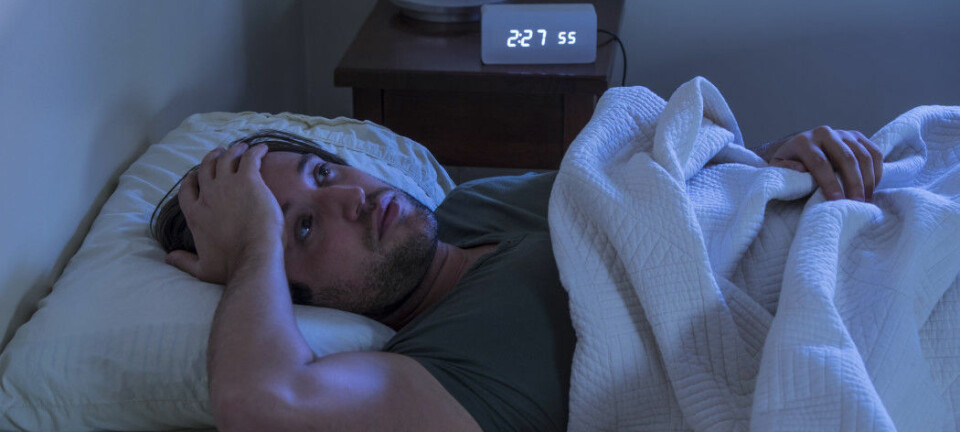
Online therapy can help people with sleep problems
People who participated in digital sleep therapy used less sleep medication afterwards, according to a new Norwegian study.
You twist and turn, fluff your pillow and close your eyes once more. The body is tired, but the mind keeps churning.
Most people experience occasional insomnia. The bedroom might be too warm or you’re anticipating a tough day ahead.
But for some, sleep problems become chronic. Insomnia affects between 10 and 15 per cent of the population and is the most common sleep disorder. The key phrase is poor sleep, but how it manifests can vary.
Some people struggle to fall asleep, others wake up several times during the night or too early in the morning. The severity varies. Those who are really struggling may have a combination of all of the ailments.
Thought patterns as medicine?
Most people with insomnia are treated with sleeping pills. They may help in the short term, but researchers believe that other non-pharmaceutical methods are more effective long term.
Changing one’s mindset is the key. Researchers from the Norwegian Institute of Public Health, NTNU and the University of Bergen have investigated the effectiveness of digital therapy, and they believe the results are promising.
The study was recently published in the journal Lancet Digital Health.
Therapy in front of the screen
Researchers believe that cognitive behavioural therapy can resolve sleep problems. An important goal for this type of therapy is to "break self-reinforcing vicious circles that perpetuate mental health problems," according to the Norwegian Association for Cognitive Behavioral Therapy.
This kind of vicious circle can result in poor sleep.
More than 1000 people over the age of 18 and who had scored high on an insomnia test participated in the study.
The participants were divided into two groups. One group underwent digital cognitive behavioural therapy, and the other group received information about insomnia online.
Therapy without a therapist
The cognitive behavioural therapy took place online. The therapy programme was divided into six stages with 584 participants.
The first step introduced the participants to insomnia. They mapped their own problems and set personal goals for the treatment.
“The entire treatment is automated and controlled by algorithms. The user has no contact with the therapist during the treatment,” writes Øystein Vedaa. He is one of the main authors behind the study and a researcher in NTNU’s Department of Mental Health.
In steps two and three, the programme focused on how changes in behaviour can help with sleep. Step four had to do with thoughts and feelings, and how they can affect sleep.
Step five dealt with lifestyle and environmental factors, while step six was about avoiding relapse after therapy.
The other group in the study did not receive therapy. They were referred to a website with guidance for patients with insomnia. There they could read about the causes, prevalence, consequences and symptoms of insomnia and receive advice on when they should seek health care.
The website offered recommendations on how to make changes in one’s lifestyle, environment and behaviour to improve sleep.
Best results from behavioural therapy
The researchers compared the participants' scores on the insomnia test before they started therapy and had read about insomnia with their scores after nine weeks. The results showed that the group receiving digital cognitive behavioural therapy clearly had the best results.
Of the participants who received online therapy, 38 per cent showed improvement, as compared to 8 per cent improvement for the group that received information about sleep problems.
Previous studies have shown that less time in bed with a greater focus on sleep is effective against insomnia.
“What works in the treatment of insomnia are restricting sleep and controlling stimuli. Those in the group who received cognitive behavioural therapy had to change the times they were allowed to spend in bed. And they changed this from week to week depending on how well or poorly they slept. This regime was very effective,” Vedaa says.
The researchers found that the effectiveness of the online therapy was as positive as face-to-face treatment with a therapist.
Less medicine
One of the most important findings in the study had to do with the use of sleeping pills.
This is the first study that can show that patients reported reduced use of sleep medication following their digital treatment, according to Vedaa.
“This is very important,” he says, “because sleeping pills are not recommended for long-term sleep problems, but they are still the most common treatment. Sleep medication is addictive and often loses its effectiveness after a short time.”
For the elderly, the use of sleeping pills may increase the risk of falling.
“And more people experience a negative effect from using sleeping pills than experience a positive effect,” says Vedaa.
“We have a great need for methods other than medication. Sleeping pills work great for so many people, because they fall asleep from the medicine. It’s almost a problem that it works so well in the short term,” GP Petter Brelin said in a 2019 interview with forskning.no.
“A lot of people become very fond of the medication, despite the fact that most of them quickly became addicted and build up a tolerance to the pills,” said Brelin, who previously headed the Norwegian association for general practice.
Related to psychological issues
We’ve known that sleep problems and psychological issues are connected. Not being able to sleep leads to increased worries, which makes it even harder to sleep. Pretty soon you have a vicious circle.
Many people think it is harmful not to get their eight hours of sleep. This idea can frighten people and raise their anxiety level about lack of sleep, which makes it even more difficult to sleep at night, according to Daniela Bragantini in a 2019 interview.
“The brain keeps on thinking, even though it’s actually going to sleep. It’s difficult to say whether the anxiety or the insomnia comes first – often the two disorders reinforce each other, and it turns into a circle of stress,” said Bragantini, who is a biologist in NTNU’s Department of Mental Health.
A solution for everyone?
Even though the digital therapy was effective against insomnia for participants in the new study, does that mean that this kind of therapy works for everyone?
“Programmes like this seem to be effective for most people, but probably won’t be a good fit for everyone. In some studies, researchers have looked at whether it’s possible to identify who will and won’t benefit from this kind of treatment,” says Vedaa.
Younger people with milder sleep problems tend do best with such treatments, but older folks and those with more serious sleep disorders can still benefit, according to Vedaa.
“We have to do more research in this area to identify who needs more comprehensive follow-up for their sleep difficulties, so that they can try other treatments as soon as possible,” he says.
Translated by Ingrid P. Nuse
Reference:
Vedaa, Øystein., Kallestad, Håvard., Scott, Jan., Smith, Otto R F., Pallesen, Ståle., Morken Gunnar., Langsrud Knut., Gehrman, Philip., Thorndike, Frances P., Rittermand, Lee M., Harvey, Allison G., Stiles, Tore and Sivertsen, Børge. (2020). Effects of digital cognitive behavioral therapy for insomnia on insomnia severity: a large-scale randomized controlled trial. Lancet Digital Health.
———

































